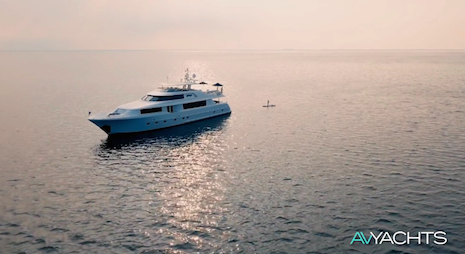U.S. yachting company AvYachts is bringing inspiration from the sharing economy to the world of yacht ownership with its new project: “Instant Yachtification.”
Under this new initiative, AvYachts customers will be able to commit to as little as 10 percent ownership of a yacht while being guaranteed three weeks on board per year. This move, inspired by the likes of Airbnb and other sharing economy startups, will allow even more customers to experience shared yacht ownership, lowering the bar of entry to begin yachting.
“Entering the world of mega-yacht ownership can be intimidating, given the unknowns of operating, maintaining and storing a large vessel that requires constant attention,” said Kathy Kennedy, chief operating officer of AvYachts, Fort Lauderdale, FL. “Instant Yachtification makes the entryway much more accessible and enjoyable through a shared ownership model that provides instant admittance to this exclusive world. Now, the luxurious experience of yachting is available to those seeking this lifestyle choice.”
Sharing economy
The sharing economy has disrupted much of how modern businesses are handled. From Airbnb in the housing and hospitality industry to Uber and ridesharing services, these startups have lowered the barrier of entry for formerly exclusive services and reshaped how they are offered.
The sharing economy in 2014 was valued at $14 billion, but is expected to be at $335 billion by 2025, according to the Brookings Institute.
Now, AvYachts is seeking to bring some of that innovation to how yachting is performed by today’s wealthy. While yachts have long been a mainstay of the wealthiest class, their prohibitive price has made them the domain of only the topmost percentiles of the affluent.

The deal is designed for people who only have a limited amount of time to go yachting each year. Image credit: AvYachts
Under AvYacht’s Instant Yachtification effort, consumers will be able to share in joint ownership of a yacht, with the lowest commitment of ownership being just 10 percent.
Customers can purchase either a 10 percent or 20 percent share in the yacht, which equates to three or six weeks guaranteed time aboard, respectively. In this way, customers who do not have the time to go yachting for more than a few weeks per year can avoid the astronomical expenses of owning and maintaining a yacht.
Instead, AvYachts will provide a dedicated crew and maintain the yacht for the shared owners, who will receive a portion of the proceeds when the yacht is sold at the end of the five-year lease.
Barrier of entry
Instant Yachtification is not the only democratizing effort the brand has put forth.
AvYachts expanded its move into the travel sharing economy through a partnership with vacation home exchange program Elite Alliance.
Via this new agreement, owners of AvYachts’ vessels can trade a week on their timeshared boat for a three-week stay in an Elite Alliance property. This partnership furthers AvYachts’ mission to open up luxury seafaring to a wider affluent audience (see story).
Outside of the sharing economy, other recent innovations have had a noticeable effect on how yachting is conducted today.

The sharing economy is growing at an astonishing rate. Image credit: AvYachts
For example, responding to the rise of cryptocurrency use in other luxury sectors, Royal Yacht Brokers is now accepting these digital payment methods for rentals and sales.
Global currencies such as bitcoin and Ethereum and national currencies such as CryptoRubles can now be used to charter or purchase the service's mega yachts. Due to the anonymity associated with these forms of payment, a number of luxury categories that cater to the well-heeled have adopted these currencies (see story).
As the overall luxury world continues to experience disruption, the yacht industry will have to remain flexible to the needs and habits of the modern consumer.
{"ct":"a360hrcsI5vYvuPHx4I0aIMAMY4Sl24S8ZXELltlOZ9M3c\/Jtxs5HcPCzqw0ZwGeFPLkOXefuZJOfZctIY\/VApW\/1vIcFNzezihNDgMp7sDd7QcmRT+lI9f8EGqQCCG0fdNMJfPdQTrIYYah5wjWGm2LneFNIWb7377r7Y\/G6hn6bdOLy0q42kMSnlRIwiwPN8fuUUf4J6rqKX866Viqt27ZjEhEqqcn1WCmho\/QBNtZDBj2kjrhkKjIoBRbrqRaxLiF+dxXvHViVC9VLS7Moy2+S7N7mQoqKwiAYFgJjQ2wVvQ82crU+Q62PTMfJW0yk7REW5DtvnAGOlpx6mmhm+\/Dw+N9b1CWSdhxi6SS8BEXocFzHx2W\/inWGoMYzV74PuTQ\/O3IaylrmIn8HGYRmYagMnOHoyl0njoUFMgg9KqR869p\/954JY\/x1AleP21JaiCx+enp3OPm6P3ljBGxpLzIpzSEDCKebBfF283msHuD+pWQHiJwdISR8F2GdQO4HutIhqDF970s0xxqmY4mjTWGAPl0xCCI3Om8WnjIgowpEbMAEfg96XDlMBCKPL\/MB+keoHF+8TyXN7fSx2r5YrvgIeAFeLQ3KQCFIIRLdhVwH4EAgAIYfxf4\/WoEDxAafeyfVXT0PZs\/9gqg0DSjr13LDmhSRRTHZWuetXIIVF99OS3Y+gNYDkybxZOcVejfINMyXszpo2ydMnwYvolUFZ\/Fw760aEPAYgDuQfIAfJpEJw2Gqrl7VsCz8+jSNJlVLq+\/yKbg+V53F3Y84QJCBoiSOpE2+RZgkT1MnjDB3V9zO8eaNCP99+JaVVjZji+Yft7eYeMBA3tPYiDUtAH1y2kfPvMBWiPXJLwvl6ld6S+hYQzCEP1JVlFl4hMTgcHITEhDo67ek2J1xXEWwAzV+lk\/6r7nEuzqAcP\/FH4nR4ML\/OOVaJ6bqQCOO5UHfH20ZlCvrNUrPEuxDx8Qs\/0cScDC9M3NDHOmjW0Lk\/60aAWU\/TPV6RmdykFokBZNEoDFTMxkzcRl9mrPCIItbNSUUneGJoDyy4pJXGAEZDXv0G\/ZAdKLbbI+xwrDtJCrDBkigpyodeSdRtFN7jJNX6UQqY6PqgcKhzTACe7CPNwizHJXuUTXB+Vx2LLQIMvCL\/pC4M81MmmWjcEZTZWQptAPgcZUGHHmwD+JKuwohSqwu6FO7ToNjftjbZ5Vz+y54yGi0RiHYUvO3W7clu+5ZJXsORKRkP9fsSFQVRfGfPNDOuiwRMnutAyiZX1Al6bjid31isFT7QS2bLijqXalQgUyTGrTKG2neSx0urm8k97LeZ0x0Ob7YahyQ1qP\/MufZpl4G773Ph\/Ho9D9vkz9aIsH2Yo6FR+2ingUm3tRRWfD8rpBgpmVS5UiSG2KAxxQYxKBO77WKyjc0hPGGr6F1aXkowJYkC0wirwGlgE\/LeaDwo7AaOswGhq6aKHpDmrJirhQgeAssRqXU\/BIZEz\/yoGYWhUZgRO4P28q30TsKullKBmBk2AlMxLc3IRyXAdqdY6mccdWJw8ILzNcXxBfoz41Nw498n50uzF+aj+E3kbndxO+MY6Ucjnm0HOnRA2PP4XscOlhfzCmQVFnMzqRGT9NRxKcwl\/bnVslacZU0JdeVW\/SdjHu6NxDNNwUcMm71tx0Q\/CWwIH5FzV91903GtmweAdTz\/jl5ZiQSKbeLF\/yBWSO+ja6DrqMOafBw6W\/XMQHuVjDbJCiD98ianYfhHtaNFv4jItprPn2aNopW4DkN6WUoSb2jbM4JFHWqlo8lWOyvfeMI5KUzpFZV9FA4sLYhdjh6XLfCSUxkqXTHbgi7c8X+sqMZiqp1lhNRLHQcTJkvSjQLqMyUSZdkpdpzqdGAmhBsdjPpCkTh\/Q\/UWIVHmQAMPjT3Z553kp5MQ4kLt7ATdLpzFp9WFLuI2jlxg832jpndB2MikgJyiyJzOEcaGYtHg4ajTrmWhcBL5TASz9fgyBiKbKHAd\/2L+V\/fhBk16eF4Id2IYig19UVhoERluAthq7Z6CfpcyvcQYoGCJaboXS0iBOlHrVwaylWZqhcWjjcMMv0ZFunQRa0L6kRZIj0ul9z84+Am1jgG7CgPUVHWNMox7OcI9dwcrjnjaQc8kQsdhdRUrIHlGrEhDEljI6AsKlJd2uRx\/OCwKK\/xQHoTqJdk\/LZnYZ1fZDkUI43ETKsm9jL+uJhFADreNcWhFzytUpnaFcdenuKcMBdqNaXtrd1uGfDDqVC+bZX6TZQKcjPw5siH3JCnByL4uLe59r9C4EoyNOB88t9PHOrVrYLhEvqZ+o9piOlTdbYSr38LCiBVaZC+dAZrrhIo0EfI5Q8swkpS4XWwC7\/axjnYoKOS7P7Aj0h4sBy\/tXOJoEiHPXplYAE0ZWvuM2apBfgeuZ0RIrqeFZMVLtymTEHgRaDOVjRvG9XVXN4P585SCS5ZHLXUTMsHc4Tkk76DbJ+DAxV3of65tMkeEyn8ffkzJAKqZ9+2ys5IJDH0CeO2s080irh9bJQQsLjnJhxa3+\/GMZbvqHV77Qkwmn7Az7rneAmmd6tsn\/Qjcic0h\/xDRG92mjHVjUQr994IEhzsKob2G0nHuR75LKRHR0eNEv2OSVwVWm2NTURtRv7ro5EXrSSboxA7+ggApcgiCC2QohqzQ6loryKyN1S1Brl0hIAGHgI1Agn8X4oM27ZrgueTLIRKqEA9F7xmW2GzAYJKlXE4+DxQADMxts+Jv6ZCAxN0lj2TQKmu1nwxmZQbIxY\/3TAlqejCa6G7sxahZXj3JuNggLEmUSmkYYpXZpvVILn5A1R35CX4TE4j4s4UTrIMifgK\/e5kPuZrI0DPbAFTfa1QKg5dozyRoRzuG6AQR1InZCgLAPyZpnyf123M+DyZ58LvPTeLV2LXEMV47iTg3n43Cc14DLyJxiBJL8SAh\/WTiaHO4fjXUY3Wd6GJDLbCKC1wDk0r5NOontsDS8hyr3ZDRRZmAT38M0q\/wuP2nyusMlPsjxkgal0l0kUrCb+Q27fRCe7uFTdaBwTgFx8LGulIfbQaWzdVTL9Bd72\/PdTtfwS9AOLbzR9CrNA2+wBJYJCFHIPbG+NDD2mmoFj\/hEB4BpsYVSu2n72AiiHkLkFNbYra2+Xwx04esoL2qkoK8vJ1ER4HYHyurQUwHeW\/FbV3+uCs9kf\/2N0s1Vi1mHTVmnpXMaVWnewndrU9whdOOlFEk5\/f6hC2haq65yFOZRdbNXyzXLmqpIr3Fplx\/WOJ0Uc5XONCa7x8Z\/QLR0KfyxHcPFqKXD67O7Ln8+0ibTCD1XkNp3w3yxv4wpz7HII4nmUBotXkKaCsdSrYGOWCuo4\/zco77vEwA8TKTUQ1SQ4q8jBi06qaAKSYVY5WNG2haeqgR00hZ7+g5Dmr3T6K7nsUCrAUhbeA\/2c1\/B1Z8I3E74qakSuxAIWft2NrxHh7t2p5W5HeXsT1b62Cuu48IZu\/MeMyvHVWO7tkiIv6FnGtASpKm5j9MuAmzfWtQJJBWXZKWrB20yWGc4281Vz\/u4WsJEyVSqzWjm\/AOu05nR908gjHZ7OioPJ59qa\/WXixLg91phC7oDotSoRymEaONIE6Ur3FxoUhmUOCLTW+abw0tq+zqH2YXRN5HR\/RbHliSaFFvor70giIK0cMYdcimDjkaNF0\/oAvVZN7b7gOgHT+Hp9IeG7QE0+tZqhObUNrEZWloPLkn6IFEZvavjNJe\/fHcTzV8wbN4ZIN1ak+g9Rzi3m+WVe8fZ7+hwdWDnltl7pQ22egAY+s+lffb00Eq9RLI1L4HaxoSLXEA0LkT4Mnw8F7Na7qrr2gSszSIfAi6L\/yymuqDzP\/pYpEpWVAx7mYkLxelG0J0AIJHLPy0Yw0Ltb4X8x09bXfOnzfKFPvDwiYavME7AVXPXBIqEWQTNR+kPNUwhLZcfOhea9hhNbl5jJbDTyUeJlNRMC5s3+qB+e8gqxgYbExTgSx\/a9a9c52aMzN\/okFFPLuyi8Rx8ji0FF+RNPWg6TDhzY5UoX3m9zd6r4heNB\/KzhU95EnuVR5v6A8A0GUvSvNInZotbh2WTw6tH4rbwuEi08kqSmKm0Ri2rIo5\/ulPNhxo2QefKpYO2\/oJcaK6+hSc2lQo9lVyPUJUzlH4dCoqY4qB0H1tMs9\/jCXl0ORwSu9jR0ChKd9FoFJZbUdHjL6lrgg0GOaCQkR+A29QJEQpnPxV8cboFXDf3x4kikB4OA5PtxBcYovL\/EXdhcDkZqY2IpNKbLW4uXueI3GB+wlmO9BOmMNBB7zmWywcnxd\/cRPovlxL9oWGBVhQ3hkbHcF84Bv47acSfqWCHKjFwTDVq8YL1bLdyFhJ10+aM+nOGYGsmYXaONLzANKj2Det7Uw0cl9m7EC1daEcRn6oCijhhh64LXF2ikJj\/7uMLC7HRud21R0DgvLOkNQI0fGKzWtmhQ2D+NiSSf+DmUEp0KJzoSENDO4RPrqQXTJgR0SXALeVm3cAYjNKs5hszKmX2BkqCNwbJbAPXCAzEkMCrPFuYb8AegXf+5N6OdcKrjVkqbz+4FkVdTklfUq3hU3jnKCdGIxk5G6sXHD7FXJIB7xfHxmMsv42gvfAfAVEIq9zfeqcRsFL5GGpV0k87FvTgqKl9doCQ0\/WdKtqDbS0\/3zGVd+Uvd0AYPO3kbJlBy1ZSqHNUscoSyhL35wjASQZoSDvFLweVZSDr2mxog9aV1H3zr+W8zOykLutaTdX1yh7IOfyAco7kubvurPEYLoo5ofCtOJAAX3i0b\/wUMdTiyImWbo3cTlLkaqNYveX+wQiOwpu0G4JclpRh6PevPARKnbFAwOViF9lGvQgsJNSMhMMIcaxQ0RgMGB+YBbAigKiMgax2o6p3l2sqDz7PLHNPxHmxCkg4dISfyAHClVg9Y9DMDmH2q6ErlbZKxpYUzrUtNq1ez5oo6aX5HQ4qCGoPnFXhhKX4HvUAYA\/OhXAxOZJCcjEw4fesv7jtKM1eYBOgZ6yJIn10fyrH+Q0NYlu17f5dp5+oUeexI97q7EFNOuE\/dGbObYZzIRhBqylaZ2YxY0mW4R9Gg1THQpl7grsaTqZC81Uv\/b0RyiHbdsK+cHVOyqRSkISwWEhYufTnBNBd9iI70j7LIka3ixpHpDIhOFBmQUpBlXD7XYbfrEL0dsPtnhk2ZIQptdyn\/zuZZ0bWQSrWF71PrYr7QgQZsZiBa4IYOazy0YYpRQez5wxNr0nUZ\/BMY5DXR1CrKDxFwW07iT7fuzQ9KdyPYXBhOSz3HnkwTu8Eor4vAJWidkm60lvI7Ymi2ndNWgIEe9tbEeUdO9b28RKyKnaQvF3byZ7gZNqqNamfVM0QJaT\/ABs4EVQnJ15zACZr6eHoaTx1rooJIj8NXAiJYggRLpRlIbz2U7Lv1pJ2QPm3Vja4V6j4hhTZICDDpCQ2ulx2d7eN9McLNee7yS0YAy19Mv8cj8GPX7okJzdmjidXHWjlZmxBGTJ0VYWMx2kauZbqy5qHEkWVMt7hJjQeWNQx8tqGf2JxhPzOcndl2pQN+b9aAypW6OWwWiP0ynVmmqYtEBj06Gyk53Yn\/N4bn4grPCM\/fGi4ZDdT4CU2xjuUDiuz8\/DEG\/AFhFt3a08\/OZ7plkpaU1Ly7UUvOnYX3JBgZbzzXor7D26yQ5PqLl89nQmENoC5emPBmvg1AnkE6ZP0sRqZDvkhcM7aOJl1VOka1o+oQGM4r3RnhK2hTxPQCt5Fgnw1+JBOt1caRkVAig7lRgSFbdNNWjuDdWM0wcscrExLap+hAdQlMcYOS5YS90iG+WIuzvIRq82YpmIlzrdcPTJ6Xx5NwngqBogIao3YVT\/5IYmMm10r8Vz+la3Te4e4oe1VIoAqleDYz+oppZNkuhc8hQKdnRTKSBgG9mY84QRWE3tuQTuZcYwYDZ4zwtQdL0WrIHshWKWr3wdxlo5ck5yXF\/SA9CZne0SW6tAvYuwbXG67sG2hqE+MPUxBhT0uKs0wkHnA1BeTh9hmU2cz\/u5Xd20+kIRQxA2tmpMzJHs+Rm2LUzY1e+HtXhnk2zt7oT6XX6t64m1dYxBAPidR\/nv5hKsz4qzgsUoze9HjNXDcuGQP9CwuZ76bjVOkjhzoVlh2PVwoBAx4Q4FSQGaX1BxSwbxZmZnrFUq8Yc8MPQGGrXIN0YtXN8QVRtSErZmx4hQKSfRl2LOVox9OPzJhwTHu9uGbGeYC8muffCQSrinNAoujtAejPra+VruLXVr23eQOYP\/y43Tcl+iNekZXKrYzCycpAY676A6hRA9Q0KjOS\/dNLcq6pkx6jhxSwC1NuHy5fbp7UVPSvS60v7BVN+\/oc53V9mYMiBSGYkFNGMXHUjyh8YCDotjoN09h+4YwKwZkJofzAEXrNF4\/to0YYI17gF7GJOfpnl8ESRLZvDGwqHofYc0GvSrfAR4XkCc6niNTL4RDlA6GgYYf4Dkjt51jyXs0QBX24\/ief\/XkwdsH\/sMYcYVPmvA\/HGlA9jVrZw3GXkWQWfRV8AXi0ecIEGy0ZLOC0DJQEs12st\/TFDKmxBt2GF0rfNoEWAVx1CvT73xLlywBk+Wsm63Sevgr2DLh1DBtR08gOQEh6fhgTObioXaGoVQ5bLFGU8vbIZwFeifGZZTW5iAS3QrlZTJyLZrYWOFjmh1+4hpFGOAgMTKNh4ARRbGA\/rwL401kJk4taCgqfJKvWnOfeRAKsReAX6wq+p5Rj9oWxowFdFo3E8jxACwwpxR6n70dZqjVExdDwg8zJUk4QR0MmzKP+OQ+C6jETQyK9de4VsTfsuNKkXJagmTVJzA5teUDZWt8c1NkTMKIqk37kimwPxakrMfQl0IsUKqQP6F6zMfT8i3i3y7xmgeU+FeTJOQtR1y1kJsYr7I076TcpnQmlnsYOKQYuoiKXr7QSeC6EN5OcpAjFmVYN0srnbJRRi4fF2n8S5nZL7dA2Rn\/JfAp5BZws9tiu64ogJxZK7sKwrUF6sFBXqQZsFmSkLdN+ffluIqcUeTp6fyXmKy2g\/fimrdKmEgcc7autcESYrOPBcjSSog==","iv":"c906676c49a639049bc0eec26ab8a71c","s":"394061208fdb458f"}

 AvYachts' latest effort is inspired by the sharing economy. Image credit: AvYachts
AvYachts' latest effort is inspired by the sharing economy. Image credit: AvYachts